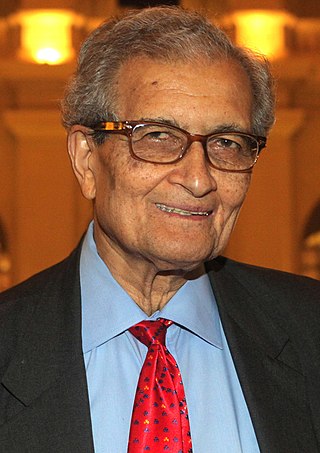
Amartya Kumar Sen is an Indian economist and philosopher, who has taught and worked in the United Kingdom and the United States since 1972. Sen has made contributions to welfare economics, social choice theory, economic and social justice, economic theories of famines, decision theory, development economics, public health, and measures of well-being of countries.
Development economics is a branch of economics that deals with economic aspects of the development process in low- and middle- income countries. Its focus is not only on methods of promoting economic development, economic growth and structural change but also on improving the potential for the mass of the population, for example, through health, education and workplace conditions, whether through public or private channels.

Albert Otto Hirschman was a German economist and the author of several books on political economy and political ideology. His first major contribution was in the area of development economics. Here he emphasized the need for unbalanced growth. He argued that disequilibria should be encouraged to stimulate growth and help mobilize resources, because developing countries are short of decision-making skills. Key to this was encouraging industries with many linkages to other firms.

Sugata Bose is an Indian historian and politician who has taught and worked in the United States since the mid-1980s. His fields of study are South Asian and Indian Ocean history. Bose taught at Tufts University until 2001, when he accepted the Gardiner Chair of Oceanic History and Affairs at Harvard University. Bose is also the director of the Netaji Research Bureau in Kolkata, India, a research center and archives devoted to the life and work of Bose's great uncle, the Indian nationalist, Subhas Chandra Bose. Bose is the author most recently of His Majesty's Opponent: Subhas Chandra Bose and India's Struggle against Empire (2011) and A Hundred Horizons: The Indian Ocean in the Age of Global Empire (2006).
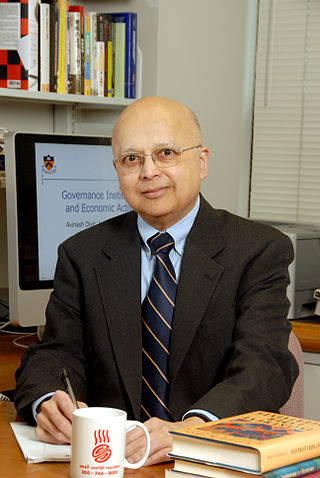
Avinash Kamalakar Dixit is an Indian-American economist. He is the John J. F. Sherrerd '52 University Professor of Economics Emeritus at Princeton University, and has been Distinguished Adjunct Professor of Economics at Lingnan University, senior research fellow at Nuffield College, Oxford and Sanjaya Lall Senior Visiting Research Fellow at Green Templeton College, Oxford.
Robert Hinrichs Bates is an American political scientist specializing in comparative politics. He is Eaton Professor of the Science of Government in the Departments of Government and African and African American Studies at Harvard University. From 2000–2012, he served as Professeur associé, School of Economics, University of Toulouse.
Jean Drèze is a Belgian-born Indian welfare economist, social scientist and activist. He has worked on several developmental issues facing India like social welfare, poverty and gender inequality.
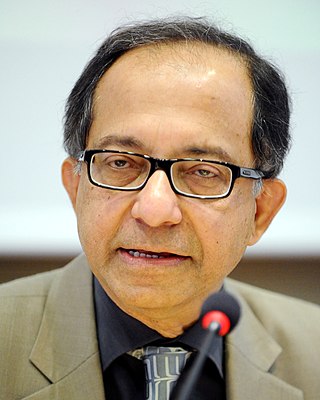
Kaushik Basu is an Indian economist who was Chief Economist of the World Bank from 2012 to 2016 and Chief Economic Adviser to the Government of India from 2009 to 2012. He is the C. Marks Professor of International Studies and Professor of Economics at Cornell University, and academic advisory board member of upcoming Plaksha University. He began a three-year term as President of the International Economic Association in June 2017. From 2009 to 2012, during the United Progressive Alliance's second term, Basu served as the Chief Economic Adviser to the Government of India. Basu is winner of the Humboldt Research Award 2021.

André Beteille, is an Indian sociologist, writer and academician. He is known for his studies of the caste system in South India. He has served with educational institutions in India such as Delhi School of Economics, North Eastern Hill University, and Ashoka University.

Samuel Stebbins Bowles, is an American economist and Professor Emeritus at the University of Massachusetts Amherst, where he continues to teach courses on microeconomics and the theory of institutions. His work belongs to the neo-Marxian tradition of economic thought. However, his perspective on economics is eclectic and draws on various schools of thought, including what he and others refer to as post-Walrasian economics.
Amiya Kumar Bagchi is an Indian political economist.
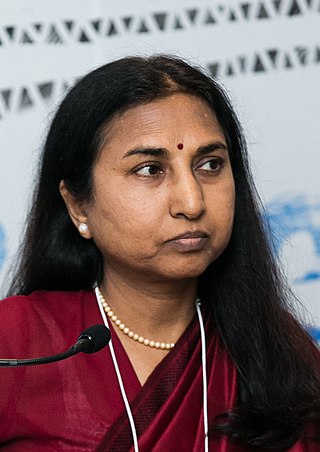
Bina Agarwal is an Indian development economist and Professor of Development Economics and Environment at the Global Development Institute at The University of Manchester. She has written extensively on land, livelihoods and property rights; environment and development; the political economy of gender; poverty and inequality; legal change; and agriculture and technological transformation.

Mihir Rakshit is an Indian economist, known for his work on fiscal, monetary and other policy, especially issues that concern developing economies. Originally from Chittagong, which is now in Bangladesh, he did his graduation from Presidency College, Calcutta, post-graduation from the University of Calcutta and his PhD from London School of Economics. He taught at the departments of Economics of The University of Calcutta, The University of Burdwan, Presidency College Calcutta, and Indian Statistical Institute Calcutta, as faculty. He also taught at Delhi School of Economics and Erasmus University Rotterdam, as visiting faculty. He served the Reserve Bank of India for two terms as a member of its Central Board of Directors. He was director of the open access quarterly journal Money and Finance published by ICRA Limited from 1997 to July 2016.

Sugata Marjit is the former Vice Chancellor of the University of Calcutta and currently the First Distinguished Professor at Indian Institute of Foreign Trade and the Project Director of Centre for Training & Research in Public Finance and Policy (CTRPFP) [A Ministry of Finance, Government of India funded initiative]. He is a Ph.D. at the University of Rochester and currently the Editor of South Asian Journal of Macroeconomics and Public Finance. He used to be the Director of Centre for Studies in Social Sciences, Calcutta from March 2007 to March 2012 and Reserve Bank of India Chair Professor of Industrial Economics at CSSSC till September, 2019. On 15 July 2015 he took the charge as an interim Vice-Chancellor of the prestigious University of Calcutta, Kolkata, India.
Bhabatosh Datta was a noted Indian economist, academic and writer. He taught at Chittagong College and later became Professor of Economics, Presidency College, Kolkata, where he later became anEmeritus Professor.
Mrinal Datta-Chaudhuri (1934–2015), popularly known as MDC, was an Indian theoretical economist, academic and a professor of the Delhi School of Economics. He was a member of the Institute for Advanced Study, Princeton. The Government of India awarded him the third highest civilian honour of the Padma Bhushan, in 2005, for his contributions to literature and education.
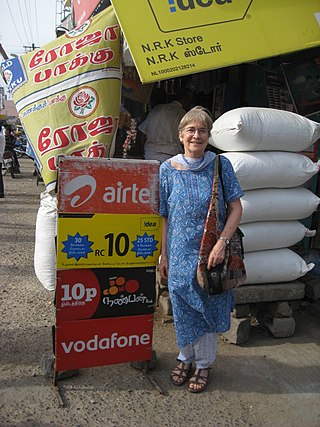
Barbara Harriss-White is an English economist and emeritus professor of development studies. She was trained in geography, agricultural science, agricultural economics and self-taught in development economics. In the 1990s, she helped to create the multi- and inter- disciplinary thematic discipline of development studies in Oxford Department of International Development; and in 2005-7 founded Oxford's Contemporary South Asia Programme. She has developed an approach to the understanding of Indian rural development and its informal economy, grounded in political economy and decades of what the economic anthropologist Polly Hill called ‘field economics’.

John Charles Harriss is an emeritus professor of international studies at Simon Fraser University, visiting faculty at the London School of Economics and Professorial Associate at SOAS. In 2017, Harris was elected a Fellow of the Royal Society of Canada.
Dwaipayan Bhattacharyya is an Indian political scientist. He is a professor at Centre for Political Studies, Jawaharlal Nehru University.












